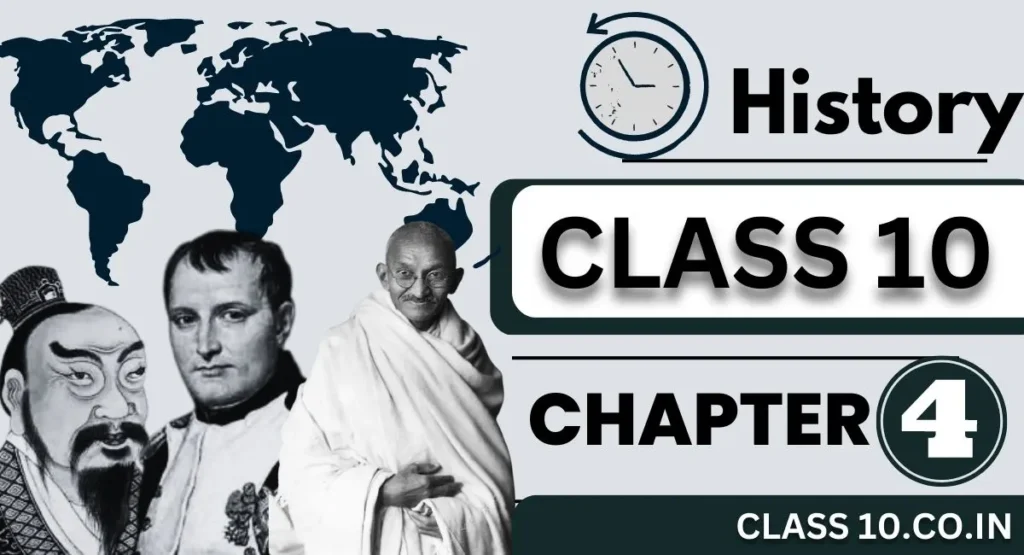Are you a student of class 10th and you are looking for important question answers in NCERT History Chapter 4 Class 10 MCQs?
this chapter is very important for the exam. Many questions from this chapter have come in the exam. Because of this, it is very important to know the question and answers to this chapter.
So students, after reading this article, you will get a lot of marks from this chapter in the exam, because the questions related to all the exams have been described in it, so definitely read it completely.
Ncert History Chapter 4 Class 10 MCQs The Making of Global World
| Class | 10th |
| Chapter | 04 |
| Chapter Name | The Making of Global World |
| Board | cbse |
| Book | NCERT |
| Subject | History |
| Medium | English |
| Study Materials | MCQs |
Objective questions and answers | Ncert History Chapter 4 Class 10 MCQs The Making of Global World

1 Who discovered America?
(a) Christopher Columbus,
(b) Martin Luther,
(c) Marco Polo,
(d) none of these
Answer – (a)
2. Who was Henry Fort?
(a) Car manufacturer,
(b) Computer manufacturer,
(c) Motor cycle manufacturer,
(d) Mobile manufacturers.
Answer – (a)
3. When did the Bretton Woods agreement take place in America?
(a) 1942 ई०.
(b) 1946 ई०,
(c) 1940 ई०,
(d) 1944 ई० ।
Answer – (d)
5 When did the Great Depression begin?
(a) 1940 ई०,
(b) 1942 ई०,
(c) 1945 ई०,
(d) 1948 ई०।
Answer-(d)
6. When was GATT established?
(a) Since 1929 AD
(b) Since 1932,
(c) Since 1933,
(d) Since 1936 AD.
Answer – (a)
On which day is Human Rights Day celebrated?
(a) January 10,
(b) 10th August,
(c) 10 December
(d) 10th July
Answer-(c)
7 Which region of America was called the City of Gold?
(a) New York,
(b) New Jersey,
(c) El Dorado,
(d) Baltimore.
Answer-(c)
8 When did the first world war happen?
(a) 1916 1920,
(b) 1914 to 1918,
(c) 1939 to 1945,
(d) 1912 to 1918
Answer-(b)
9 What was rinderpest?
(a) Fish diseases,
(b) Flower disease,
(c) animal diseases,
(d) none of these
Answer-(c)
| class 10th Notes | MCQ |
|---|---|
| History | Political Science |
| English | Hindi |
| HOME | CLASS 10 |
Which of the following diseases proved disastrous for the people of America?
(a) cholera,
(b) small pox,
(c) Plague,
(d) none of these
Answer-(b)
Which of the following was considered an allied nation?
(a) Britain, France and Russia,
(b) Germany, Austria-Hungary and the Ottoman Turks,
(c) Japan, France and Germany,
(d) Britain, Japan and Russia.
Answer – (a)
12 Which of the following methods was adopted by Henry Ford to increase car production?
(a) vertical line,
(b) assembly line,
(c) horizontal line,
(d) none of these
Answer-(b)
13 What was the time period of the Great Depression?
(a) the decade of 1929-1930,
(b) the decade of 1930-1940,
(c) the decade of 1940-1950,
(d) The decade of 1950-1960.
Answer-(a)
14. What do you understand by G77?
(a) group of rich countries,
(b) Group of African countries,
(c) Group of Asian countries,
(d) Group of developing countries.
Answer – (d)
15. What was the Bretton Woods system?
(a) Post war military system,
(b) Post war political system,
(c) Post-war international economic order,
(d) none of these
Answer- ©
16 Which were the first two European races to come to India?
(a) Dutch English,
(b) Portuguese – Dutch
(c) English – French,
(d) French-Dutch
Answer-(b)
In which country did the Potato Famine take place?
(a) America,
(b) England
(c) Ireland,
(d) Spain.
Answer-(c)
Which disease spread very rapidly in African cattle in the 1890s?
(a) pneumonia,
(b) Skin diseases.
(c) small pox,
(d) Rinderpest,
Answer– (d)
19 Which country passed the Corn Law to ban the import of maize?
(a) China,
(b) Britain,
(c) India
(d) France.
Answer-(b)
20 Which of the following country can veto any decision of World Bank and IMF?
(a) India,
(b) Sri Lanka,
(c) America,
(d) Japan
Answer-(c)
21 Which of the following did not become helpful in colonizing distant countries?
(a) Rinderpest,
(b) Smallpox bacteria
(c) Gun powder,
(d) Potato.
Answer-(d)
22 Which of the following were considered Axis Powers?
(a) Britain, France, and America,
(b) Nazi Germany, Japan, and Italy,
(c) Japan, Italy, and France,
(d) Nazi Germany, France, and Britain.
Answer-(b)
23 The import of which grain into Britain was restricted by the Corn Laws?
(a) of rice,
(b) Pulses
(c) Wheat
(d) Maize
Answer-(d)
In which conference was the International Monetary Fund (IMF) established in 1944?
(a) Round Table,
(b) Vienna,
(e) Bretton Woods,
(d) G-77.
Answer-(c)
25 Which institutions are also known as the twin children of Bretton Woods?
(a) UNO and Security Council,
(b) World Bank and IMF,
(c) G-77 and G-8,
(d) All of these
answer-(b)
26 Who propounded the principle of drain of wealth?
(a) Dadabhai Naoroji,
(b) Firoz Shah Mehta
(c) Mahatma Gandhi,
(d) Bal Gangadhar Tilak.
Answer – (a)
27 Economic Great Depression started from which country?
(a) Britain
(b) France,
(c) America,
(d) Germany.
Answer-(c)
28 When did the second world war happen?
(a) 1914 to 1918,
(b) 1916 1920,
(c) 1936 to 1944.
(d) 1939 to 1945.
Answer-(d)
29 ‘Silk route mainly connects which two continents?
(a) Asia and Africa,
(b) Asia and America,
(c) Asia and Australia,
(d) Asia and Europe.
Answer – (d)
30 Which are the privileges enjoyed by five countries in the United Nations?
(a) of voting,
(b) Veto,
(c) both (a) and (b)Of,
(d) none of these
answer-(b)
Class 10 History Solution
Class 10 History MCQs

